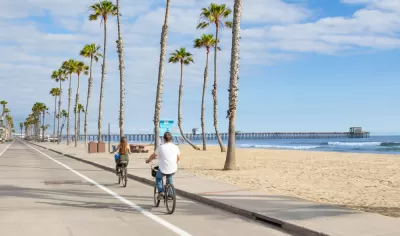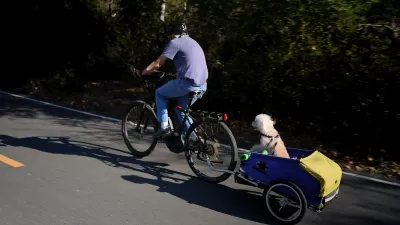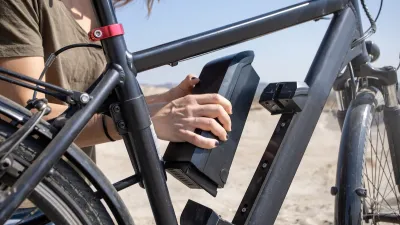A program that distributed over 400 e-bikes to low-income San Diego residents is poised to go statewide.

A rent-to-own program for e-bikes makes it possible for San Diego residents to access e-bikes that might otherwise have been out of reach. Emily Nonko describes the program in Next City, writing that “Low-income participants access e-bikes at no initial cost, while agreeing to ride an average of five miles a day, track and share rides for a study, and secure their own bike insurance. If the participants successfully complete the program after two years, they own the bike.” Participants who do not meet all requirements can still purchase the bike at a prorated cost.
The program, called Pedal Ahead, began in 2020 and has distributed more than 400 bicycles across the county. The San Diego program will serve as a model for an expanded statewide program called the Electric Bicycle Incentive Project, sponsored through a $10 million allocation from the California Air Resources Board (CARB). According to the article, “A portion of the $10 million will be dedicated to outreach, education and operations, with Pedal Ahead hiring representatives in other parts of the state for operation management, community engagement and more.”
Nonko adds that safe bike infrastructure is an integral part of encouraging a shift to multimodal transportation, but that e-bikes can help more people feel comfortable getting on two wheels.
FULL STORY: How A Loan-To-Own Program In San Diego Is Boosting E-Bike Access

Planetizen Federal Action Tracker
A weekly monitor of how Trump’s orders and actions are impacting planners and planning in America.

Maui's Vacation Rental Debate Turns Ugly
Verbal attacks, misinformation campaigns and fistfights plague a high-stakes debate to convert thousands of vacation rentals into long-term housing.

Restaurant Patios Were a Pandemic Win — Why Were They so Hard to Keep?
Social distancing requirements and changes in travel patterns prompted cities to pilot new uses for street and sidewalk space. Then it got complicated.

In California Battle of Housing vs. Environment, Housing Just Won
A new state law significantly limits the power of CEQA, an environmental review law that served as a powerful tool for blocking new development.

Boulder Eliminates Parking Minimums Citywide
Officials estimate the cost of building a single underground parking space at up to $100,000.

Orange County, Florida Adopts Largest US “Sprawl Repair” Code
The ‘Orange Code’ seeks to rectify decades of sprawl-inducing, car-oriented development.
Urban Design for Planners 1: Software Tools
This six-course series explores essential urban design concepts using open source software and equips planners with the tools they need to participate fully in the urban design process.
Planning for Universal Design
Learn the tools for implementing Universal Design in planning regulations.
Heyer Gruel & Associates PA
JM Goldson LLC
Custer County Colorado
City of Camden Redevelopment Agency
City of Astoria
Transportation Research & Education Center (TREC) at Portland State University
Jefferson Parish Government
Camden Redevelopment Agency
City of Claremont





























